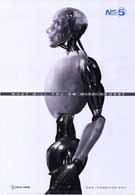The trailers for I, Robot had my expectations lowered appropriately. I think like anyone who’s seen The Crow or Dark City, I kept mumbling the “I trust Alex Proyas” mantra, but my faith in him weakened with every subsequent advertisement. Then I read that I, Robot’s script was adjusted to give the film more of a “Big Willie” style after Will Smith came on board and my interest bottomed out. I like Will Smith, but this is Asimov and his tendency to be “wild-ass” just didn’t seem appropriate to the material.
As it turns out though, this isn’t Asimov… not exactly. The script was something written independently from anything having to do with Asimov’s classic short tale of robot murder (I, Robot) and then later re-written to incorporate a lot of Asimov’s robotic themes (like the three laws of robotics) when Alex Proyas picked up the screenplay. The result is something part heady Asimov intelligence, part big time effects movie. The two don’t always mesh together perfectly, but they do so well enough to create a surprisingly entertaining and even occasionally brainy summer flick.
Proyas’ hand is most keenly felt in the first few minutes of the film, when Detective Del Spooner (Smith) stumbles out of bed into the shower. His apartment is by all appearances nice, but normal. He cranks up the radio and strips off his briefs, leaning heavily against the wall in the shower as he massages some sort of recently healed injury to his shoulder. Smith is best in this movie when he’s not saying anything. He achieves a kind of quiet, beaten down intensity that would have been perfect for the tone of the film, if only he’d stayed silent. But he’s Will Smith, so eventually he stumbles out the door of his modest apartment to start making wisecracks. The world outside his place is a futuristic one (2035 to be specific) filled with millions of servant robots caring for all manner of menial tasks; delivering packages, walking dogs, and picking up trash.
Robots are perfect helpers. The three laws hardwired into their brains make them utterly incapable of harming a human. No robot has ever broken a single law, let alone hurt anyone. Still, Spooner doesn’t trust them. In fact he hates them, with the kind of fervent prejudice usually displayed only by more devout members of the Klan. Since he’s a cop, his hatred leads him into all sorts of bad situations. On his way to work he sees a robot running down the street with a purse and gives chase, automatically assuming the robot is a thief though no robot has ever committed a robbery. He tackles the automaton, only to discover the robot is racing to bring its owner her inhaler, a mistake which lands him in trouble with his cliché police chief (Chi McBride).
Spooner is looking for an excuse to bring down a robot and finds it when he receives a call from the world’s most powerful robot maker, US Robotics. Their chief inventor has just committed suicide, flinging himself from their office building to the ground thousands of stories below. But Spooner doesn’t think it’s an accident, laying the blame on the inventor’s latest creation, a robot that seems to show evidence of emotion. What follows is a series of action set pieces, in which Spooner is beaten and thrown around in pursuit of the truth.
The accused robot, who insists on calling himself “Sonny” (voiced by Alan Tudyk), is at once both tragic and sympathetic, managing to steal the movie right out from under Smith with a weird brand of mechanical mystery and charm. Sonny’s journey to learn and understand human emotion is not a new idea, but it’s still extremely well done. Proyas gives us a few particularly compelling moments of conversation with Sonny pumping into the film a level of depth that a big, empty action movie might not otherwise have. There’s a girl (Bridget Moynahan) too of course (required isn’t it?) but give I, Robot some credit for managing to have a male/female relationship without shoehorning in romance. For once, the participants realize that just because their naughty parts fit together doesn’t mean they should take time out from saving the world to test them.
But it’s the robots that matter and I, Robot pulls them off. Thousands traipse across the screen in nearly every scene, each doing something unique. The old ones are sort of sad and lonely, you actually feel sympathetic for them as they’re replaced by newer models. The shiny new NS5’s which cause Spooner so much trouble are almost disturbing, geared to look more human with their malleable faces atop bodies of hoses and gears. Nearly all of this is done with CGI, which for the most part works. I heard Proyas say that he used a lot of the lighting techniques he learned shooting new car commercials to light his robots and that shows, sometimes to the movie’s benefit, sometimes not. New car commercials are after all their own kind of reality, crafted specifically to make the car appear as a dream version of what the vehicle really looks like on the road. Yes, Proyas does a fantastic job of bringing out the design and shape of his robots, but occasionally that takes away from the reality of what’s happening on screen. They look good, but in a few cases it wouldn’t have hurt to give them a presence that achieves a more gritty and grounded style.
I, Robot is a cool summer movie packing a nice mix of action, explosions, and brains. The ideas aren’t strictly fresh, some of the plot devices are a little too convenient, and yes, Will Smith is for the most part still doing the same old stuff you’d expect from Will Smith. But none of that really hurts. If there had been someone with the courage to avoid plopping in those extra “Big Willie” quips (funny though they are), Will could easily have made his character something special. As is, he shows enough flashes of intensity and grit to keep things on track while Proyas fills in the gaps with a robust mix of serious and fun. This isn’t the dark, heady Asimov movie we might have hoped for and this certainly isn’t Proyas at his best. But I, Robot is solid and exciting entertainment, well worth a lingering look.











